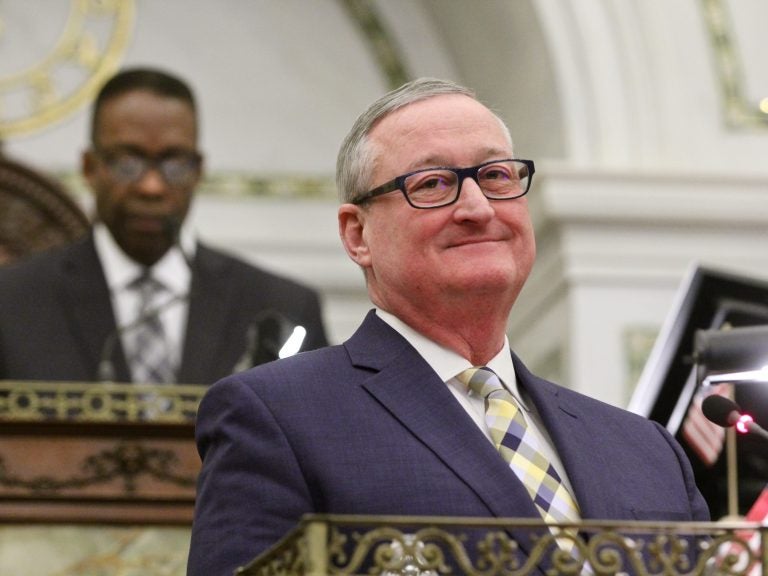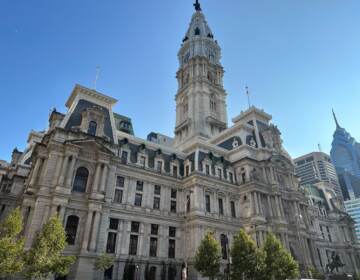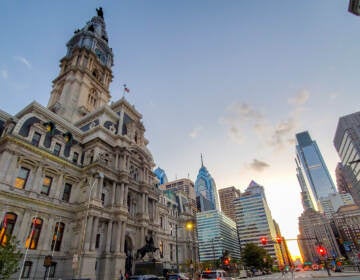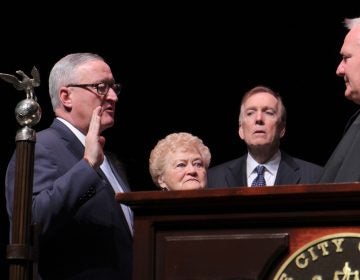NYE nix: Kenney vetoes food truck ban, kills Society Hill carve-out and more
Mayor Jim Kenney told City Council Tuesday he will not sign six pieces of legislation, killing the bills.

Philadelphia Mayor Jim Kenney at City Council. (Emma Lee/WHYY)
Updated 5:42 p.m.
Mayor Jim Kenney prides himself on his good relations with City Council, especially in contrast with his predecessor. Unlike former mayor Michael Nutter, he has never vetoed a piece of legislation.
Until now.
With his first term coming to an end, the mayor Tuesday released a letter to the city’s legislators announcing that he will kill six pieces of legislation via a handy maneuver known as the pocket veto. The opportunity to pull such a move comes only once every four years at the end of a Council term when the sitting mayor can simply decide not to sign bills and, thus, quietly sentence them to death.
The letter outlines his concerns with the six pieces of legislation. While they all “address issues of mutual concern,” Kenney writes that he cannot sign them at this time.
The bills include Council President Darrell Clarke’s mandate for community benefits agreements and Allan Domb’s wage tax rebate. An expansion of the homestead exemption that accompanied the recent alteration of the 10-year property tax abatement got canned and two bills that rewrote the city’s zoning rules for Society Hill. Also dead: an unpopular ban on food trucks operating on Market Street between 33rd and 34th Streets in University City.
The pocket veto of the CBA bill and the homestead exemption expansion put Kenney on a collision course with Clarke, who championed both pieces of legislation.
“While the goal of this legislation is important, these are meant to be private agreements between the developer and the community group involved, with the City not involved,” writes Kenney of the CBA bill, which sought to require developers to give back to the communities where they build large projects.
The mayor said the upcoming budget season would be a more appropriate time to consider the homestead exemption expansion, which would expand the property tax break, and the wage tax credit introduced by Allan Domb.
“It’s disappointing when you consider, particularly on the community benefits agreement, all the work that went into it,” said Joe Grace, Clarke’s spokesperson. “Particularly all the members of the community who testified, even the business community lent its voice. Frankly, it’s disappointing and we look forward to the resumption of City Council in January.”
Most of the bill sponsors will be returning to City Council next session, so in many cases, these pieces of legislation could well be reintroduced next year. The same is true of a bill introduced by Councilmember Brian O’Neill, which would have banned roof decks from his entire district, and was vetoed by the Planning Commission (which was exercising power it also only enjoys at the end of a four year Council term).
The exception is the food cart ban on Market Street, which Councilmember Jannie Blackwell got passed on her last day in City Council despite a storm of protest from the affected vendors. The bill was pushed by Drexel University.
“The food truck operators that offer low-cost menu options to customers there, including students on limited incomes, are small businesses whose existence depends to a large degree on choosing the right location from which to serve,” writes Mayor Kenney. “There has been a significant outcry against this bill from the affected community … further discussion is warranted before imposing such a sweeping ban.”
The affected food vendors were ecstatic when they learned the news early Tuesday afternoon.
“We are absolutely thrilled that the mayor heard our cries,” said Jessica Caldwell, owner of Red Stone Pizza and manager of Dos Hermanos Tacos trucks. “We are beyond thrilled, I can’t even put into words how happy we are that this saga is over.”
The Blackwell bill was only the latest in a year where multiple Councilmembers have tried to ban food vendors from whole swathes of the city or from smaller blocks where more powerful constituents evidently wanted them gone.
The Society Hill bills are the latest attempt by the wealthy and historic neighborhood to rewrite the zoning rules for their community. The bills would have exempted the area from laws, recently signed by Mayor Kenney, that were meant to encourage preservation projects by getting rid of parking minimums. They also would have downzoned much of the neighborhood.
“These are burdensome restrictions on development,” the mayor writes. “Additionally, this may inhibit creation of new affordable housing units on blocks that are very transit-oriented, accessible to jobs and amenities, and designed for multiple units.”
City Councilmember Mark Squilla, an ally of the mayor, said that he was “surprised by the action.”
Councilmember Domb, however, had sharper words for the mayor.
“This is a complete failure on your Administration’s part to help individuals and families fighting to get out of poverty all across our city,” Domb wrote in a letter to the mayor about his pocket veto of the wage tax relief bill.
WHYY is your source for fact-based, in-depth journalism and information. As a nonprofit organization, we rely on financial support from readers like you. Please give today.







